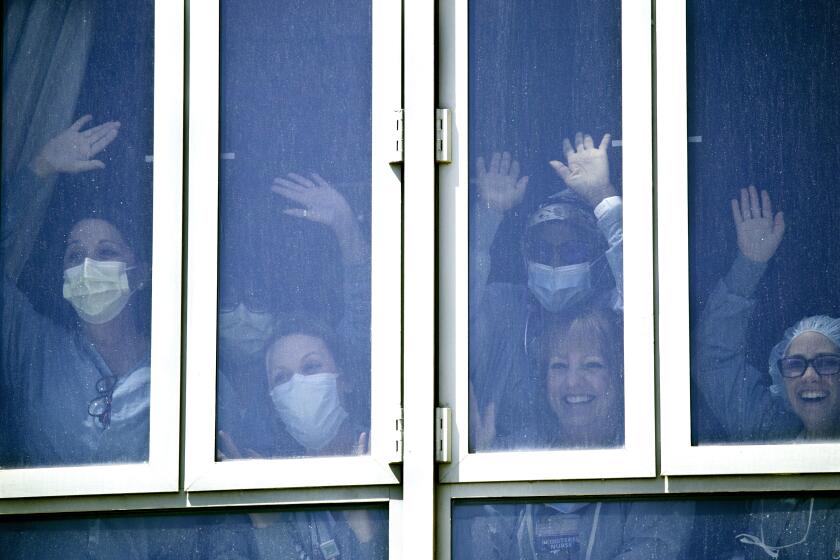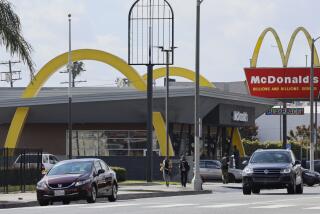California food workers will get extra paid sick leave amid coronavirus crisis

- Share via
SACRAMENTO — Gov. Gavin Newsom signed an executive order Thursday requiring companies in the food sector that employ 500 or more people to provide two weeks of supplemental paid sick leave for full-time workers who contract COVID-19 or are exposed to the virus and need to isolate themselves.
Under the order, part-time workers are eligible for a lesser amount of sick time determined by the number of hours they typically work in a two-week period.
“We don’t want you going to work if you’re sick, and we want to make sure that you know that if you’re sick, it’s OK to acknowledge it,” Newsom said. “It’s OK to let your employer know and still know that you’re going to get a supplemental paycheck for a minimum of two weeks.”
The California Grocers Assn. and the United Food and Commercial Workers union support the new sick leave benefits, which the governor’s office said fills a gap left by a federal law that provides paid leave benefits to workers at smaller businesses.
Firefighters and law enforcement officers from L.A. to Laguna Beach express their gratitude to healthcare workers for their efforts in fighting COVID-19.
The supplemental paid sick leave would be offered in addition to any existing benefits employees receive and applies across the food sector, to businesses including grocery stores, restaurants, fast-food chains, food processing and packaging plants, agriculture and delivery services.
“Today’s announcement expands on safety efforts already underway and provides added comfort to valued grocery store employees and customers that a consistent set of best practices is being followed by all essential retailers regardless of size and location,” Ron Fong, president of the California Grocers Assn., said in a statement.
Labor unions hailed the agreement as a win for workers on the front lines of the pandemic.
“I’m not aware of anywhere where there has been a standard that applies to all workers in a division or sector,” said John Grant, president of UFCW 770. “This is pretty significant.”
UFCW 770 represents 20,000 grocery workers in Los Angeles, Ventura, Santa Barbara and San Luis Obispo counties. It has called for more retail protections over the last several weeks.
Grant acknowledged that it would have been beneficial for his members to have access to paid leave earlier in the crisis. But as is Newsom’s style, the governor issued the order after bringing the union and grocers together to reach an agreement first, rather than mandating the change without input, Grant said.
“I wouldn’t have minded a command decision-making process back in March, but on the other hand this does go farther and it will be better enforced,” he said.
Grocery store workers in particular have been regularly interacting with customers during the pandemic at one of the few types of retail stores that Californians are allowed to frequent under the stay-at-home order.
Grant said the order will allow them to feel more comfortable speaking out about any potential symptoms and immediately receive paid time off to prevent the virus from spreading to co-workers or customers.
In California, 81% of workers reported having some paid sick leave, but just 14% had access to at least two weeks of paid sick leave, according to new research by the Shift Project at the University of California.
Studies show paying for sick employees to stay home helps reduce the spread of the seasonal flu. It could help reduce the rate of spread of the coronavirus too, experts say.
Grant described the order as one piece of a larger campaign to protect workers.
After some businesses initially pushed back on allowing employees to wear masks, Grant said about 75% of grocery retailers are now complying with health and safety standards.
Several companies have expanded sick leave and relaxed attendance policies amid the virus outbreak. Walmart, Target and Whole Foods, for example, have offered up to two weeks of paid leave for employees diagnosed with the coronavirus or who are put under a mandatory quarantine.
But concerns have still sparked protests at some companies. A contingent of Whole Foods employees across the country called in sick last month in an effort to press the Amazon.com-owned grocery chain for paid leave for all workers who self-quarantine regardless of whether they have been diagnosed with COVID-19, among other demands.
The California Division of Occupational Safety & Health recently released new guidelines that advise grocery stores on employee training, proper hand-washing, social distancing in stores, disinfecting equipment and surfaces, and steps to take if workers may be sick.
Los Angeles County passed an ordinance this week that requires grocery stores and pharmacies to set up plexiglass barriers at registers where customers and employees could come in close contact. Other L.A. County rules require grocery stores and essential businesses to limit the number of people who can enter at one time and to ensure customers maintain at least six feet of physical distance between one another.
Newsom’s paid leave order stays in place as long as the statewide stay-at-home mandate remains in effect. Workers who are eligible for leave but have been denied by their employers can report a labor law violation with the state labor commissioner.
Times reporter Suhauna Hussain contributed to this report.
More to Read
Sign up for Essential California
The most important California stories and recommendations in your inbox every morning.
You may occasionally receive promotional content from the Los Angeles Times.















